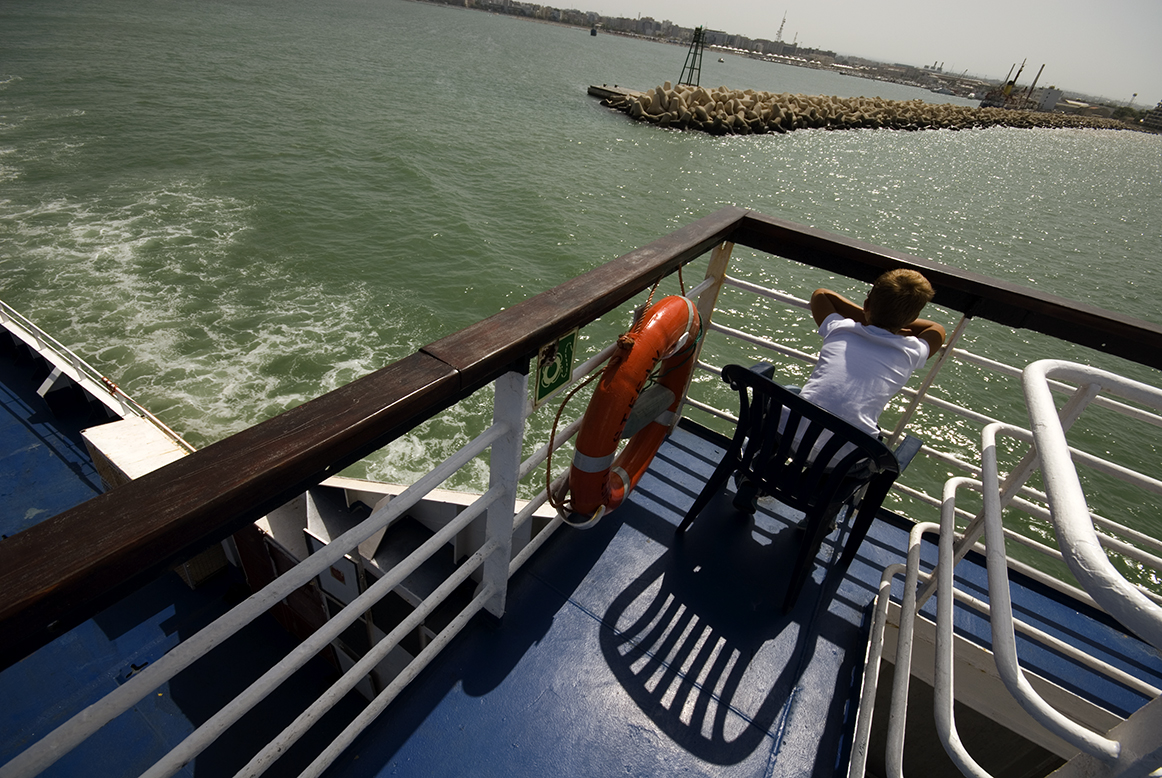
Michael studies Indo-European languages. Gianni is Arbereshe and teaches Albanian at the Calabria University. Monica is the first in Italy to have obtained a PhD in Albanology. A group of linguists and a journey in Albania through words, stately peaks, and places of borders
The report was published in a book devoted to northern Albania in January 2009 by Kovać, Hamburg
Photo-report by Andrea Pandini
Seasickness
Monica is seasick. She stares outside the windows veiled in sea spray, her face focused on enduring hours of sailing. Then, a smile. By now, the Montenegrin coast is not that far. From Bari to Bar - a vowel away from crossing the Adriatic.
Monica worked for over a year in an expedition of linguists in Northern Albania, in the valleys north-east of Scutari, to document some local idioms. She is excited now, finally the journey begins. "Michael is working on an etymological dictionary of Latin; in the last few years, he has done research in Indo-European studies at Leiden University, in the Netherlands. We will be joined by Ioachim and Stefan, who work on some verb forms in ancient Albanian at their university, in Vienna. Other people will also be there: Genc - he is an Albanian lecteur at Lecce University, Donato - who is studying the traditional law of Kanun and needs some contacts, and Gianni Beluscio - a colleague from the Calabria University", she says, her accent strongly telling of her native region, Veneto.
Hers is an interesting circumnavigation between north and south: she studied Albanian language and literature in Padua, spent some years at the Munich University, then moved to Calabria to get her PhD in Albanology, and finally the University of Lecce, where she teaches Albanian language and literature.
From Bar, in Montenegro, to Scutari, in the warmth of the summer night, the road clambers up the hill. On the border, we wait for an hour - the taxi driver mistakenly swapped his own passport with a customer's. Some negotiation, and we are cleared. Here, Schengen's Europe is still distant - borders remain fluid, tolerant of mistakes and passport pictures that do not look quite like you. After hours of waiting for a late ferry in Bar, the driver smiles again; joking, he leaves us in Scutari. Pitch black. The generator chants for half an hour - just enough to brush our teeth and find our beds.
Streams
"Language is like a stream: it flows down, it veers off. No regime can control it. This is why, despite years of marginality, we can go back to using our beloved Gheg". Ana Luka's voice is full, deep. She is staying in Scutari for a few weeks, but lives in Rome, where she works for Radio Vaticana. Her brother David is a renowned linguist, but this is a family interest: "I was in the mountains too, twenty years ago, recording popular songs with a friend, accompanied by some students. When I retire, I will rearrange all of it. The mountains were so stately, so beautiful".
In Scutari, at the Fototeca Marrubi - from the Italian Pietro Marrubi, who moved there in 1858 and opened the first photo studio in Albania - we see a picture taken in a grocery store. Shelves full like Ana's voice. A counter and a man in a white apron, staring at the camera: Ana and David's grandfather. "My family belonged to the bourgeoisie, so we were not well liked by the regime. Moreover, we were Catholic and stubborn: we would not give up our faith", she says. Later, Ana decided to leave for Italy. David stayed, was sent to teach in mountain villages, and wrote books that were not published. "But I kept on writing", he says from the depths of his armchair. He stands up with some effort, leaning on a stick, and enters his studio. He proudly reappears with a stack of books and signs them all for his colleagues - they are recent editions. Then he whispers his greetings for Genc's father - also a linguistics teacher. He is tired.
Large parallelepipeds and card indexes, showcases and shelves. Vast windows open on the outside, but concrete harbours heat. The Scutari library director keeps wiping his face with a handkerchief. He has prepared ancient books on a vast table. Monica and Gianni move closer, start to cautiously leaf through the pages. Then, they take pictures. "This is Pjetër Budi's Dottrina cristiana, published in 1664, unique", "This is Biemi's book on Skanderberg, extremely hard to find". The director seems satisfied - they look like children in a candy shop. "We have made a survey of the citizens' private archives, in order to identify volumes of value".
When asked about Tosco (an Albanian dialect declared official language in 1974) and Gheg (a local dialect), he smiles. "It is right for a library to use the official language, but I also love writing in Gheg" is the diplomatic answer from Northern Albania - the poorest area in the country, with a Catholic majority, that with the adoption of Tosco found itself even farther from Tirana. With the regime fallen, it is now legal - though not easy - to question things anew.
Outside the library, the light fills the spaces and burns the colours. Ben and Lin, the drivers, are waiting for us in the SUVs. We are off to the mountains, between the convulsions of cars, steps, and bicycle wheels - and concrete spreading in the centre. In the periphery, buildings get lower and lower, until we see the scattered houses of the dry plain north of Scutari.
Plastic and dolomite rock
Acid colours of fake flowers on the side of the road. A tombstone, and then the crag. Ben slows down and turns off the radio. His hand lingers there a few seconds, then he turns it back on: it is a gesture of respect for the dozens of fatal accidents that happen along the road from Scutari to the Thethi valley, in the Albanian Alps. Some hundred kilometres driven in 4/5 hours.
The plains lead towards the bare profiles of the mountains - behind us are the Scutari lake and the sea. Strong light, rocks, and pomegranate - a fruit that waits until the last moment to yield and become sweet, peel cracked by fire. Half an hour later, while the heath is so strong it makes you hallucinate, we cross the breakwater. The Mediterranean sea is distant now, and so is the coolness of fir trees. "We could take our next trip together with paleo-botanists", says Monica "around here is a solid tradition of collecting healing herbs, and it is very interesting for us linguists as well to see how much of the specific terminology related to single plants has remained in the local dialect".
Paleo-botanists. It is fascinating to delve into horizons that are so specific, and yet not narrow. It is fascinating to look at a country with a troubled image in Italy - cornered between clichés and humanitarian prejudices - through the gaze of someone who got to know and love it for other reasons. Plants, words.
Out of town, between the plain and the mountains, the asphalt disappears. No schools, hospitals, or shops in sight. In winter, just snow. It is the signature look for these places - isolated, harsh, enclosed. Also recently restored houses follow the traditional norms. Ben, from the Thethi Valley, says that no one sells land to strangers. For now. We are far from Tirana, where the coloured façades of the artist mayor are tissue paper to cover the skeletons of concrete that smother the city. This is a withdrawn society, where the hospitality of local families is precious, generous, but also an essential pass. The traditional law of Kanun is still in place, though contaminated, bastardised, worn down, and distorted by the younger generations that leave for Scutari or to go abroad - only to come back for the summer holidays.
Thethi. We sleep in a sort of residence between beech trees, pines and green grass. The place is comfortable, though rooms harbour a faint echo, nurtured in months of emptiness - some weeks of summer and fresh air are not enough to take it away. Behind, a crown of peaks. While there is still signal for our mobile phones, before going down into the valley, we send SMS with pictures to Italy. Where are we? Val di Fassa. Wrong.
Early in the morning, Gianni sits on a birch bench before a cup of Turkish coffee, a digital recorder, and a microphone. The back of the home-owner and the smoke of his cigarette stand out in the amber light of the early sun. Gianni talks to him, or rather nods, encourages with his eyes, and asks questions - when he has to. He wants to listen, wants the other person's sounds and words. "Forty years ago, there were two metres of snow, but there was also a hospital and a high school, it was on the riverbank. Now, with democracy, everything is hollowed". And then the horoscope, the coffee dregs, the epic of the Albanian nation. "How do you say rich?" "Pasanik". "And filthy rich?" "We don't say that here, because those who are filthy rich are thieves, and sooner or later they are going to pay". All this snow makes it impossible to accumulate anything, anyway.
Gianni gets people to talk, trying not to influence them with his standard Albanian accent. The first, fragile bridge he casts is his being Arbereshe - but he shores it up with warmth and attention. "I'd rather let him talk about what he wants, I didn't use any questionnaire - at home we'll see about studying the material".
The home-owner's son is about twenty - perfect English, polite manners. He lives in London and is back on vacation for a few weeks with his girlfriend - they met in England, but she is originally from Sardinia. In the meanwhile, he helps his parents attend to the guests. In the evenings, we play pool with him and his forty-seven year-old cousin, who works in Milan and has come up here with his family and a FIAT Doblò with a Valentino Rossi sticker on it. Between cues, chalk, and trajectories they test boundaries with some jokes. The young man is preparing to be the master of the house - it is a matter of territory.
Warriors and onions
Nestled under some oaks in the Thethi valley, we look down on the cornfields, sparse houses, and a creek - at times stretched on a bed of stones, at times jagged and hasty through the Karst gullies.
An old man hears our voices and descends from a path. Lin, one of our guides, knows him - they greet. He joins us sitting in the shadow. Michael and Gianni turn on the recorders. "Are you from here?" "Yes, I am - it's the best place ever, here we live up to 110 years old!". Gianni progressively lets Lin into the conversation, to let the old man use the local dialect. "Often, it is better to record other people talking - I might influence the respondent with my standard accent. On the other hand, if someone else uses the dialect, he will feel free to talk the way he prefers". The conversation flows, then the old man's eyes veil with tears, the voice goes husky. Lin rapidly changes the subject. The old man is a Ngujuar - nailed, stuck. He has not left his house or the immediate surroundings for years. In the past he killed a person, his son was murdered in revenge. The blood feud is not over yet.
He invites us over to his house to listen to some songs played with the lahuta, a typical stringed instrument of the area. The façade looks on a cropped slope; the entrance is in the back - packed dirt yard, bench, and bower. Our guest insists that we go in. It is dim inside - narrow doors, rooms almost shut. There is no room for all of us, we find ourselves tip-toeing in this poor and ancient world.
The old man barks to his wife to come. She appears from the back, a basket full of onions on her shoulders. She glances at the guests, but speaks all the same: "What's up with the screaming? I can hear you, you know. You're just showing off". "The hard work's not about the fields - it's putting up with him". The husband's vehemence is just an act - she is the one that bears the weight of their existence. She sits beside her husband on the steps, delicately fixes his shirt.
We all take a sip from a glass of grappa and the old man starts to play. The melodies are ancient, his eyes often turn to the sky. All around video cameras, cameras, and digital recorders - yet, it does not feel like an invading presence, perhaps because everyone speaks Albanian and can exchange a few words. Every now and then, the wife - nestled with her dirt-filled hands around her knees - glances up at the husband.
Valiant men were born from this land
Intrepid warriors like Skanderbeg
In Fushe-Kruje in the house of Kastrioti
In swaddles the brave was exiled
...
San Giovanni Decollato
We descend back to the plain between massive steps, rocky valleys, the bright green spots of plots and few houses. "What fascinates me most in these landscapes is the absence of the in-between, unlike in Italy or France. It is either mountains or plain - two separate worlds", says Michael, long-limbed, calm and collected, in his rich Italian veined by a slight Spanish accent. He has been interested in languages since he was a kid and used to go abroad with his parents. Now he is constantly travelling between the words of the present and the past, to discover their common roots. "Mamma, majka in Serbian, mother in English, mater in Latin - it is the same word found in different languages. There are many words like this, that have the history of at least part of humankind in them". Michael studies Indo-european - the Albanian language is very significant in this regard, as it makes its own stock within this family.
The heath of the plain, again. Under the sun, two lambs spin on a spit in front of a restaurant - hallucinated eyes in the flayed bodies. Gianni talks to his wife on the phone, in Arbereshe. Ben and Lin, the drivers, listen curiously - for once, they are the ones making linguistic remarks. Then reassurances in Italian: "Don't worry, everything is fine here. Today we are in Hoti, we are going to the feast of San Giovanni Decollato and tomorrow we are going back to the mountains, in Vermosh".
Hoti is a village of houses small like tins. Every summer, there is a celebration of the patron saint. People arrive only when the sun sets, pastel colours gradually drying into blue, grey, and violet. A wide square in gravel in front of the town hall, like a small concrete box, cars and vans letting out high heels, elegant clothes, sunglasses, and young people all dressed up to the nines. There are also older people, shoulders covered, long sleeved, dressed in their Sunday best. Then a stage and traditional music, pumped by electronic instruments and backing tracks. A cameraman of a local TV channel is filming the singer. Gaze fixed into the camera, he revolves around her, swinging his hips too: she is his world now.
Once again, I beg you not to leave me.
It would have been better not to have you,
every night my heart breaks
On the opposite side of the stage, beyond the street, the entrance to the church. "It has not always been here" says the head of the village "it used to be on the hills, then it was destroyed under the communist regime. With democracy, a man who had run to America came back to Hoti, with funds and donations. And the church was rebuilt here, downtown".
On the wall dividing the clearing between the church and the cemetery sits Marta, white trousers and black T-shirt. She is from Hoti, but has lived for many years in Lecce, where she works at the university. She is here for the summer holidays. She is talking to some nuns dressed in opposite colours, dark robes with white glimpses. They are young too, like Marta. One of them breaks away from the group and playfully hops behind a statue of Saint John the Baptist. The cross-shaped stick pointed at the sky, an old woman in black contemplating its whiteness, and the nun squatting behind the statue. All around, children looking for her.
"This celebration is an opportunity to gather and meet, and in this period there are also many people that are usually abroad", says Marta. "Also, they come here to look for a husband or a wife", she adds with slight detachment.
A few hours of music and partying, and with the dark everyone goes home. The queue of cars turns around and becomes a dance of red and white lights. Trees are outlines flowing from the windows, fingers stretched towards the mountains, profiles pitch dark. On the sides of the road, many people walk back home, in their Sunday clothes.
Young wife
In the Vermosh valley, in the extreme north of Albania, plum trees are loaded with sharp red fruits standing out in round symmetries against the sky. The landscape is well groomed, the grass beyond the fences is short, grazed by cows and sheep pasturing freely.
We sleep in a carefully renovated house that shelters those who transit through the valley. Among them there is often an Italian priest from Padua. This whole area is his diocese. The owners sleep elsewhere, we are greeted by a balding man, perhaps forty or a little older, of kind, shy manners. He is with a young girl, not even twenty. She is dressed in black and moves quickly from one door to another and then outside, to collect the laundry. A child's face, diaphanous skin, she is the young wife of a widower.
Vermosh is a valley besieged by the border that crosses it, coasts it, covers it. A strip of Albania, and all around what everyone here still calls Yugoslavia, but is now Montenegro. One of the farthest houses, at the top of the valley, is close to what used to be a barrack. At its entrance, a small bunker, claustrophobic heritage of a regime that felt under siege itself. And then the sweet series of cobs, the overlapping of crowns, and the lilting rhythm of a windmill spraying water into the horizon. The barrack's façade reads "Marksizëm-leninizmi". The owner of the house below moves swiftly, quickly jumps a fence, shows us the border. Genc confirms, observes, asks for the details, with the same attention used to study the maps in the previous days. Then, he plans to get here from the sea in the weeks to follow, through Montenegro, and explore the whole area. He has a traveller's meticulous curiosity and working methods. A linguist and a translator, he translated Umberto Eco's "The Search for the Perfect Language: The Making of Europe" into Albanian. All of this is surrounded by a jester's thrill for life. The border will be explored on his trusted Aquilante, an old Fiat Uno, baptised after the legendary horse of the "Armata Brancaleone". Genc passionately loves and knows by heart the whole Italian cinema of the seventies.
Vermosh is a very isolated area, it takes hours to drive to the nearest petrol station or hospital - with a paradox. It only takes a few minutes to get to Montenegro and the first village, Gusinj: paved roads, supermarkets, petrol stations - a different world. Yet, unfortunately, import duties are high, so it is worth, a few times a year, to go to Scutari. Also on other issues, the two states have never signed cross-border agreements to take these small communities out of their marginality. Now, Montenegro urges to build a motorway along the whole valley, to make connections between the area of Gusinj and Plav and the capital Podgorica easier. A painful twist, the change from dirt roads to dual carriageways. We look again at the still valley and descend back on a path, among ferns. On the roof of the last Albanian house - a satellite dish. Inside, many saints re-surfaced with the strength of cork despite the years of real socialism.
At night, the steady chanting of generators, only silenced by the dim light of low tension bulbs. The thread in the glass does not blind nor tire the eye, you can observe its undulations. Light as warm as a candle's. Then, even that disappears. Genc jokes, cleverly. The regime intended to electrify the country, but electrification was quickly followed by candle-ification.
Lips, eyes, ears
A wooden bench against the house where we are staying in Vermosh. On the one side Gianni and his microphone, on the other Monica. Between them, the home owner. Gianni points at his own eyebrow, then nods at the other's answer. Then the lips, the cheek, the shoulder blade, the forearm. They are talking about body parts. Earlier, it was about possessive pronouns - my brother, my sister, my pigs - and plurals. "If a man goes into his plot, finds two pigs, and asks his neighbour: are these...?" "Yours or someone else's?". Monica had been fishing for possessives and plurals for days.
"It is worth noting how even in such remote areas there is a knowledge of the standard language" says Monica, "which is very natural, because the world moves forward, because of television, the increasing contacts with the rest of the country. It is very natural, although it is a pity for linguistic heritages to gradually disappear. This is one of the reasons why fieldwork is so fascinating. You can grasp at least bits of this heritage, record, and study them".
A bit farther, Michael is recording too. The night before he had written some sentences with the others, now he is making Diana read them. Diana is cheerful, smiling, caring. She helped Monica organise the trip and is now travelling with us. She teaches history in a high school in Scutari. The first day we met her, she took us to the town fortress, on the top of a hill towering over the horizon. And then there is the legend of Rozafa.
"I do not like this name, I never have" says Diana "because it is a story of betrayal between brothers". Once upon a time, three brothers decided to build a castle in Scutari, but despite all their efforts evil forces kept destroying their work at night. A sacrifice was needed, one of their wives'. The first one to bring them lunch the next day would be sacrificed. The two older brothers warned their wives, but the youngest of the three did not say anything to Rozafa. Crying, she accepted her fate, on two conditions: a hole had to be left in the stones at the level of her eyes, so that she could still see her baby, and another at the level of her breasts, so that she could feed him too. Since then, mysterious streams of dense, white water flow out of the castle's walls. Those who heard the story say that it is Rozafa's milk. "No, I do not like this story at all. My husband is the youngest of three brothers", Diana repeats, still walking in the yard within the walls, cobblestones smoothed by steps and bad weather, grass trying to soften the surface.
"When the moon is high in the sky, the wolf comes and eats the goat", "Yesterday I saw you at the library and gave you our book", "In Scutari there is one mill only, whereas in Holland there are many", "When I went to school, we could not read Gjergj Fishta's Lahuta of the mountains". Diana and Michael continue their work.
Preposition ËN
We walk across the border and the road is paved now. We walk towards Gusinj, some kilometres away. We are in an area of Montenegro where there is a strong Albanian community. "This is what we are interested in" Gianni explains "exploring the dialect of these villages, also because here standard Albanian is not taught in schools as it is outside the border. So, perhaps, the local dialect managed to retain more traditional features".
"I'm coming, I'm coming, I met some Albanians coming from the border. Don't worry". The man turns off the phone and instantly shifts back from Serbian-Croatian to Albanian. He is tall, thin - the hollowed cheeks and the unkempt beard make him look older than he is. He moves elegantly, though. The whole group walks around him, occupying the whole road, only to divide - as a group of cyclists at roundabouts - when a car passes by. Then, microphones out again, and the conversation goes on between accelerations and stops.
"Do you have beehives too?" "I tried twelve years ago, but then all the bees died during the winter. So I decided not to keep them anymore". "Is there a specific name for beehives?". But the phone rings again, the man shifts to Serbian-Croatian again. "All right, all right, I'm coming". He turns around, greets us, and leaves us on our own for the last part of the walk. A bit later, Genc starts to sing a song from Communist times, ironically. The song is about a mother, happy because her son died as a hero in the fight against fascism. Diana laughs watching Genc march.
"The encounter was interesting" Gianni says enthusiastically "the man repeatedly used the preposition ''ën'', that means ''in'', in a form that reminds of the preposition used by Buzuku, author of the first Albanian book in print in 1555". Monica is also lost in the world of ''ën''.
At night, after crossing the border again, we are all together again at dinner. "The werewolf exists in Italy, but not in Albania", Gianni jokes. "It survives in Holland", Michael adds. Some tomatoes, cucumbers, bread, and goat cheese. And all melts with their words, their origins, and the connections between languages.






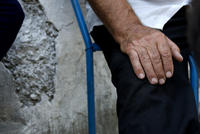
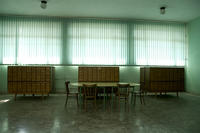
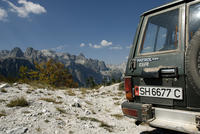
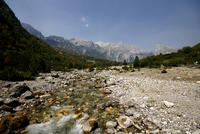
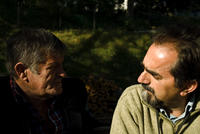
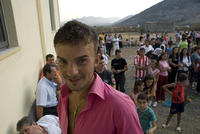
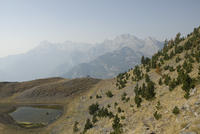
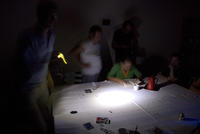
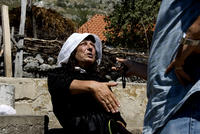
 To Top
To Top